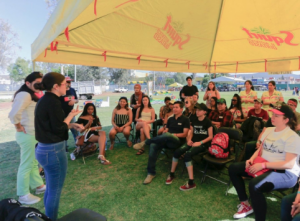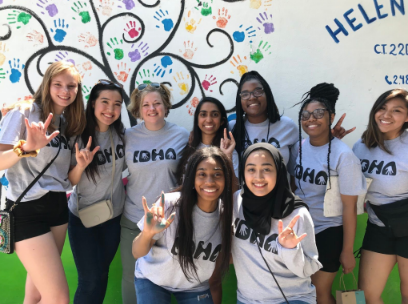During spring break, the International Deaf & Hearing Alliance worked with CAM Helen Keller, a primary and secondary school for deaf and disabled students. Each IDHA member was placed in a different classroom, ranging from preschool to high school, to provide additional support to the incredible educators and staff at the school. In preparation for our service-learning experience, we learned Mexican Sign Language (LSM), but were able to practice and learn more LSM during our experiences. We are extremely grateful to CAM Helen Keller and the Deaf community of Querétaro for welcoming us into their community to build relationships and engage in this intercultural service-learning experience. The following is a compilation of various members’ reflections on their experiences working with the Deaf community of Queretaro.
Jazmine Johnson
“Working with deaf communities in Queretaro, Mexico has broaden my perspective on people with disabilities. Before going on this trip, I did not take into consideration how huge the deaf community is and the magnitude of the struggles that the students face. It went beyond just their disability but the resources that were afforded to them, in regards to their education and family support. This humbling experience also made me more aware of my identities that I hold and made me more cognizant of all the resources that I am privy.
While I enjoyed my interactions with the students, I am really valued my time with the teachers as well. One of the teachers spoke a little bit of English, and she would inform me of a lot of the issues that the students and staff faced. One in particular really took me by surprise. For instance, a lot of parents do not like to accept that their children are deaf. As a result, they don’t try to learn sign language to communicate with them. I was astonished by this information because I would expect a parent to want to better communicate with their child. Sign language is very important as people who are not hearing should still be able to communicate with others and sign language is their medium to do so.
I didn’t know what to expect when working with the deaf community and other students with disabilities. I just know that my goal was to be engaging and open, despite the communication barrier. I really just wanted to help the students to the best of my ability and build a relationship with them. I am glad that I kept those expectations in mind, when first visiting the school. I was so nervous at first because I only knew a little bit of Spanish and sign language. However, I didn’t let that stop my efforts in getting to know the students. I’m so glad that I didn’t let my language barrier to affect my interactions and engagement with my class. This experience is one that I never will forget and I can’t wait to continue working with the deaf community.” – Jazmine Johnson

Julia Alexander
“Going into this trip, I was unsure what to expect. I had never traveled outside of the country without my family and I had never been on a service trip, so this was a completely new experience for me. However, I was excited to learn more and I thought that it would be a nice challenge and push me out of my comfort zone. I hoped that in going to Queretaro and volunteering at the Cam Helen Keller school, I would be able to have a positive impact, be helpful to the teachers and learn more about the community there.
It was so amazing to be a part of this trip. Not only did I feel as though I was able to assist at the school, I also learned so much about the deaf community in Queretaro. It was amazing to see how all of the children in my classroom actively wanted to learn, and helped each other grasp new concepts. It was so different from schools in America, where everything is about getting good grades and competition between students. The sense of community learning was a big theme. All of the activities enforced community learning. In everything that the class did, students were constantly learning and collaborating with each other; whether they were presenting, doing a group project, or simply working on math problems on the board. This was a new style of learning that I thought was very interesting because it led to a more engaged class, and excitement in helping fellow classmates learn new things.
Though it was difficult to communicate with the [students at CAM Helen Keller] on the first day, as the week went on, I was able to pick up on their signs with more ease, and better understand what they were trying to communicate to me. Also, the kids were so patient in ensuring that I understood what we were talking about, so it made it really easy to learn and comprehend what they were trying to get across.
I feel as though this trip has made me more open to new experiences. It has been so amazing to learn about the deaf community in Queretaro, and get some insight into their lives. I had such a great time getting to know the kids and am so grateful for this opportunity to contribute and learn more about this special, unique community.” – Julia Alexander
Malikah Pasha
“Imagine being able to witness a orangey salmon sunset every single day, smiles welcoming you into the door, the freshest of food swimming down your belly, fruit trees growing outside your classroom, warm and cool colors of homes, buildings, schools, and so much more. This was Querétaro.
Querétaro was the first time I left home and I can say it was one of the most welcoming and beautiful city I’ve ever been to.While Querétaro is a very homogeneous city, some of the things were a culture shock. Being that few Black people travel or even go to Mexico—especially small cities like Querétaro—everyone continually gazed at me and even touched my hair. It felt very uncomfortable, but at my school knowing that my children have many questions, I felt comfortable enough to show them my hair and teach them a little about Black hair. That experience was both a win for the both of us, because while they were always teaching me, I got to teach them about America and things about myself.” – Malikah Pasha
Carmela Garita
“Volunteering is something I enjoy doing, but in the opportunity that I was given this past week, I was able to discover a joy for working with people more closely. The first day in the classroom with the sixth graders, I didn’t know exactly what to expect. I soon started to learn that the kids were really patient with me because they quickly found out I barely knew LSM. From that first day I made it my goal to know more sign language in order to have, at least, small conversations with the kids. The rest of the days at the school got better progressively. I think what also made my experience at the school enjoyable and great was the staff there, especially Josefina, the teacher I was placed with. She would try her best to get me involved with everything the students were doing, and would even interpret her class lessons in order for me to be up-to-date to what they were learning. Something else I enjoyed were the mini-quizzes at the end of the day she would give me. This consisted of telling her what a certain sign meant in Spanish, or just me showing her what new signs I learned throughout the day. If I was given the chance to go back to Queretaro and volunteer with these kids, I would say yes in a heartbeat. I also need to give credit to the people who were in this trip, that made this such a great experience for me. I felt that there was never a moment where someone was left alone because everyone was inclusive, and willing to do different thing with different people. We all for sure got to know each other on a deeper level, rather that just knowing their name and the person who we always saw at weekly meetings. I can’t imagine having a better experience without the people and the circumstances we were all given.” – Carmela Garita
Rebecca Lee “I went to the first IDHA meeting after seeing the poster at Festifall was because I thought sign language was cool. Now it is a completely different story. I realized both through interacting with new friends and with the students at the school that knowing sign language is having an ability to communicate with people who often feel unable to do so themselves. Deafness can cut people off from others around them because of the unfortunate rarity of people who know sign language. Now that I have experienced this culture and this community, I feel driven more than ever to continue learning and improving upon my own skills in sign language. I want to continue practicing LSM and build my fluency, but I also want to start learning ASL. If I were to do so, I might be able to use a signed language in my own community, which would be rewarding both for myself and for those I would be able to communicate with. In addition to discovering a passion that I have for sign language, I really believe that this experience made me a different person. I am more patient, not only with others, but with myself. I am truly thankful that I had the opportunity to travel to Querétaro this year. The experience helped me to grow as a person, and to help my interest in sign language grow and thrive. I hope that someday soon I will be able to return to Querétaro. Even if a trip back is not in my future, this city and its people will forever hold a special place in my heart.” – Rebecca Lee
By Brandon Bond




